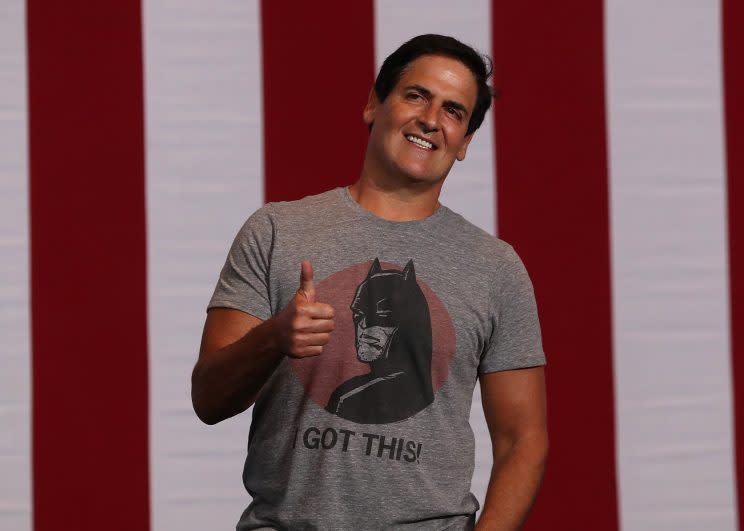Mark Cuban explains why he revoked ESPN reporters' credentials

The Dallas Mavericks and owner Mark Cuban received plenty of negative attention on Sunday night when it was revealed that the franchise had revoked the press credentials of ESPN.com reporters Marc Stein and Tim MacMahon (plus anyone else they might want to send to games). As reported by Tim Cato of Mavs Moneyball, Cuban had taken issue with ESPN’s decision to move MacMahon off full-time Dallas duty and into writing about more NBA teams. Never shy about making his opinions known, Cuban decided to bar the reporters from officially covering games at the American Airlines Center.
[Join a Yahoo Daily Fantasy Basketball contest now | Free NBA Yahoo Cup entry]
Cuban initially responded by noting that his reasons for the decision were considerably more complicated. He detailed them at more length on Monday. From the Associated Press:
Dallas Mavericks owner Mark Cuban says his decision to revoke the credentials of two ESPN writers who cover his team was driven partly by concern that automated game reports could eventually replace human-generated content.
Cuban said Monday that he banned Marc Stein and Tim MacMahon from Mavericks home games to bring attention to the issue of companies using automation in sports coverage.
The Associated Press, in a partnership with Automated Insights, produces automated stories on minor league baseball but does not use the technology for most of its sports coverage. The AP has at least one reporter at all games in the four major professional sports and most major college football and basketball games.
”Maybe I will be wrong but I see a direct path from the trends in coverage of games we are seeing over the last couple years to the automation of reporting on games and the curation of related content,” Cuban wrote in an email to the AP. ”This isn’t a knock on wire services or their reporters. They are valued and valuable in sports coverage.” […]
Cuban said he was responding to what he considers a disturbing trend of reporters being replaced by machines.
”While it may seem counterintuitive to ban someone from covering us as a way of stopping automation, it really was my only option,” Cuban said. ”As is evident by the AP partnership with Automated Insights, it’s not if but when.”
Yahoo’s version of this Associated Press article does not list an author, but we’re pretty sure it came from a human.
[ STACK: Watch the Cavaliers’ beautifully elaborate pre-game handshake ritual ]
It is very hard to be a professional writer and not find something admirable in Cuban’s stance. Automated reports have become increasingly viable options as newsrooms are forced to cut beat reporters and publications look for cheaper ways to fill gaps. The mere fact that a computer-written article on any topic is popular enough to attract the Associated Press is scary. These articles are less detailed and lack the insights and basic humanity that human writers can provide. At best, they read like box scores in the form of word problems. (Note: Yahoo publishes Automated Insights stories as part of its agreement with the Associated Press, although most of these articles deal with finance and business.)
Robots Take Over The Sports Section https://t.co/huUZr9QOSD via @HuffPostMedia
— Mark Cuban (@mcuban) November 8, 2016
So, yes, Cuban has a pretty good point. But it’s not clear why he chose to take a stand only when ESPN.com opted not to cover the Mavericks as often as they have in the past. The site seemingly hasn’t devoted fewer resources to the NBA as a whole — it just decided that those resources should not be used to cover every Mavericks home game in depth. There is as yet no indication that the AP or ESPN wants to replace its human writers with automated content for anything but stories that would not be covered otherwise.
[Follow Dunks Don’t Lie on Tumblr: The best slams from all of basketball]
Cuban’s move is more than counterintuitive — it connects the slow rise of automatic articles to a pretty reasonable editorial decision in a manner that only he seems able to understand. It’s a particularly steep example of the slippery slope fallacy, a legitimate worry in search of a compelling cause.
Whatever the case, Cuban has created a situation where ESPN’s coverage of Mavericks home games will necessarily depend on the work of Associated Press reporters. At least one writer’s job security is higher than it was a few weeks ago.
– – – – – – –
Eric Freeman is a writer for Ball Don’t Lie on Yahoo Sports. Have a tip? Email him at efreeman_ysports@yahoo.com or follow him on Twitter!

 Yahoo Sports
Yahoo Sports 

